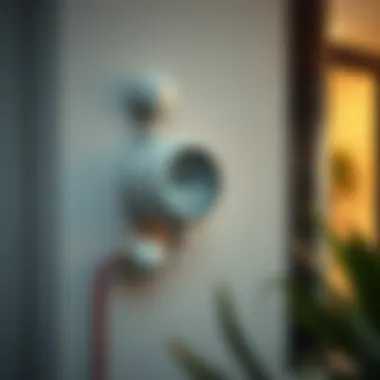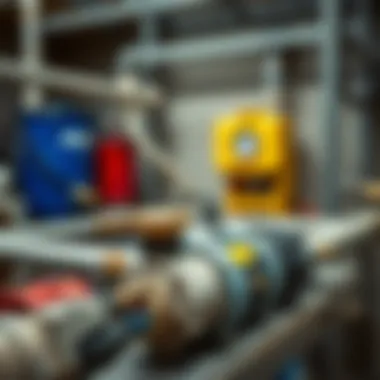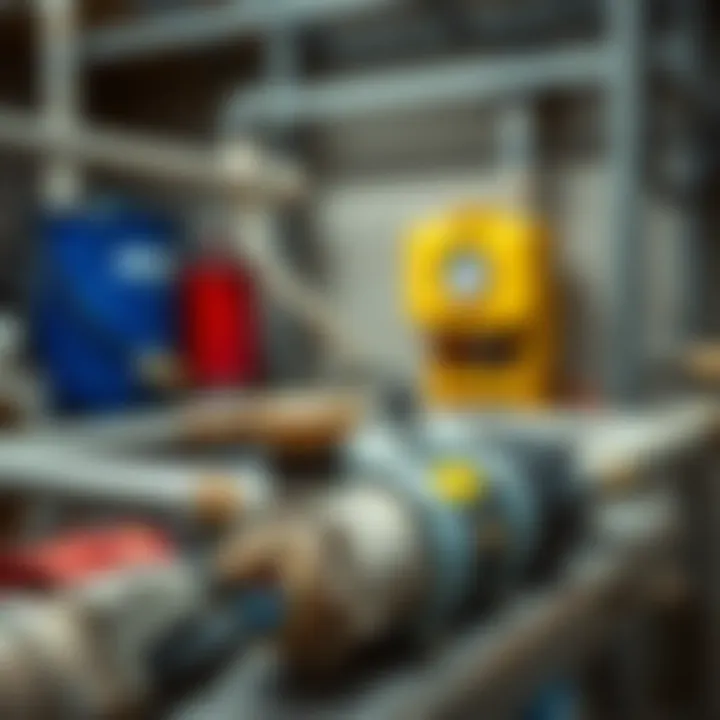Gas Connection in Dubai: Essential Guide for Residents


Intro
Navigating the gas connection landscape in Dubai can be a complex endeavor for both residents and investors. As the city thrives, the need for reliable gas supply grows simultaneously. This guide is crafted to shed light on vital aspects of securing a gas connection, particularly as it pertains to real estate investments. In Dubai, where modernity meets tradition, understanding the ins and outs of gas supply can significantly impact your living experience or investment return.
For many potential homeowners or investors, knowing the foundational aspects of gas connections is not just useful but essential. From the initial application process to the crucial elements of safety standards, this article aims to cover every base. With a keen focus on regulatory frameworks, installation steps, and the pivotal players in the market, our goal is to equip you with practical insights. Investing in property in Dubai necessitates an understanding of how utility providers operate, especially in relation to gas connections.
Gearing up for an investment or moving your family requires clarity and foresight. The nuances surrounding gas connections have implications for property valuation, rental potential, and overall satisfaction in one’s living space. As we explore the topic further, let’s delve into market trends and insights that reveal why gas connection is a pivotal aspect of Dubai’s vibrant property market.
Prelims to Gas Connection in Dubai
Establishing a reliable gas connection in Dubai is a key consideration for both residents and investors alike. With natural gas being a primary source of energy in many households and businesses, understanding the nuances of the gas connection process is essential. Residents need to grasp the regulations, requirements, and potential impacts on their living environment, while investors from overseas might find it integral to navigate these complexities to ensure their properties are market-ready.
Gas supply can significantly enhance the overall functionality of a property. For instance, many homeowners prefer gas for cooking, heating, and even hot water systems, as it tends to be more cost-effective in comparison to electricity. Additionally, with the rise of modern gas appliances, homes can be equipped with energy-efficient solutions that both lower bills and environmental impact.
When considering a gas connection, it's vital to evaluate local infrastructure, check the availability of supply, and understand the implications of adhering to regulatory standards set by Dubai's governing bodies.
Moreover, the importance of safety cannot be overstated. Proper installation and maintenance protocols are necessary to prevent accidents, ensuring the well-being of occupants and the surrounding community. A secure gas connection ultimately leads to peace of mind—residents can enjoy their homes without the persistent worry of potential hazards.
Moreover, this topic extends beyond just individual preferences or property readiness; it affects wider societal aspects, integrating energy efficiency into communal living. The overall aim is to foster a safe and efficient environment for all stakeholders involved, especially as Dubai continues to evolve into a cosmopolitan hub. This guide will delve into every essential facet regarding gas connection in Dubai, so you're equipped to make informed choices that best fit your needs.
Understanding the Regulatory Environment
Understanding the regulatory environment surrounding gas connections in Dubai is crucial for residents and investors alike. The rules and guidelines put in place not only ensure safety but also drive the overall efficiency of gas supply services. Navigating through these regulations may seem daunting at first, yet grasping them provides significant benefits such as minimizing risks and enhancing the quality of life in one’s dwelling or investment property. This section delves into the governing bodies involved in gas provision and the necessary licensing requirements for service providers.
Overview of Regulatory Authorities
In Dubai, several key authorities oversee the gas supply framework, ensuring that both providers and consumers adhere to stringent norms. The Dubai Petroleum Company is pivotal in managing the supply of natural gas, while the Dubai Electricity and Water Authority (DEWA) collaborates to provide essential services. Furthermore, the Department of Economic Development plays a role in facilitating business activities related to gas connections.
These authorities work in tandem to regulate the industry, leading to a highly structured environment. Understanding their roles can provide clarity on whom to approach for assistance or inquiries regarding gas connections. Knowledge of these entities can also help in ensuring that one’s property complies with local regulations, preventing future legal complications.
Licensing Requirements for Gas Providers
To maintain high standards, gas service providers must meet specific licensing requirements. These regulations are designed to weed out subpar companies and guarantee that only those with the proper credentials handle gas connections in Dubai.
Typically, the steps involved in the licensing process include:
- Background checks: Ensuring that the company has a clean record and adequate experience.
- Technical specifications: Providers must demonstrate their capacity to meet safety and service standards laid out by regulatory bodies.
- Financial stability: Companies must prove they are economically sound to avoid sudden service interruptions.
This thorough vetting process ensures that residents receive reliable and safe gas services. Investors should definitely verify the licensing credentials of any provider they consider, as it shields them from potential liability issues tied to inferior service or safety violations.
Factors to Consider Before Connecting Gas
Before diving into the intricate world of gas connections, it’s crucial to pause and consider some essential factors that might impact your decision. Whether you’re a resident planning to set up a cozy new home or an investor weighing potential returns, understanding these factors can save you a heap of time and trouble down the road.
Assessing Property Needs
Each property is unique, and what works for one might not cut it for another. When assessing your property’s needs, think about the size and layout. A sprawling villa might require a more robust connection compared to a compact apartment.
Moreover, consider what you plan to use the gas for. Are you looking to heat your water, fuel appliances, or possibly even run a fireplace? Recognizing the specific usage will help you determine the type and capacity of the gas connection required.
Before finalizing any connection plans, don’t forget to check if your property is already fitted for gas. This could save you some installation costs and time.
Availability of Gas Supply
Availability of gas supply is a pivotal factor and can vary significantly across Dubai. Some areas have readily accessible natural gas pipelines, while others may rely on more traditional sources. Investigating the local infrastructure is vital. Here are some tips to ensure you're on the right track:
- Check local utility providers: Websites like DUBAI ENGERY can give you an idea of natural gas distribution in your area.
- Network quality: Ensure that the network is not only available but also reliable. Ongoing maintenance and upgrades can influence your service quality.
- Future developments: Keep an eye on any upcoming residential or commercial projects in your vicinity. Plans for expansion can improve gas availability down the line.
Ultimately, connecting gas might give your property a nice boost in functionality, but understanding these factors can make sure you’re making an informed decision, tailored specifically to your needs.


Installation Process of Gas Connections
When it comes to connecting gas in Dubai, the installation process is not just a procedural necessity but a cornerstone of ensuring safety and functionality in residential and commercial properties. In this section, we will explore the various stages of the installation process, highlighting assessments, connection protocols, and the final testing phases. Each element of this process is critical, allowing for a seamless integration of gas services into everyday operations.
Initial Survey and Assessment
Before any physical installation begins, a thorough survey and assessment of the property are essential. Qualified technicians typically conduct this initial phase to evaluate the specific requirements of your home or business. This involves several important steps:
- Property Evaluation: The technician examines the existing infrastructure, including the layout and distance from the gas supply source. This step is crucial in gauging how the gas lines will be routed without disrupting existing workflows or aesthetics.
- Safety Analysis: All potential hazards are identified, such as proximity to electrical installations or ventilation systems. This assessment ensures that all installations will adhere to safety regulations.
- Consumable Requirements: Understanding how much gas will be needed for cooking, heating, or other uses helps determine the appropriate size of pipelines and regulators.
This phase can take a few hours to several days, depending on property complexity. However, it sets the stage for a customized setup, ensuring efficiency and safety right from the get-go.
Connection and Setup Procedures
Once the initial assessments are done, the actual connection process begins. This part of the installation requires specialized skills, and here’s what it usually entails:
- Pipeline Installation: Certified professionals will install the pipelines based on the approved plans. They will ensure the connections are secure and leak-proof, employing techniques that meet regulatory standards.
- Gas Meter Installation: A gas meter, crucial for tracking usage, is installed close to the main supply line. This device allows for accurate measurement and billing, so it's important that it functions correctly.
- Integration with Existing Systems: If the property has other utilities, the setup must integrate seamlessly to avoid disruptions. Adjustments may be necessary to accommodate changes in power supply or plumbing.
During this phase, all installations must be carried out in accordance with local regulations, and the installation crew must keep communication open with property owners to address any concerns or changes in scope promptly.
Testing and Commissioning
The final step in the installation process is testing and commissioning, which serves as a safety net that verifies the integrity of the installation:
- Pressure Testing: Before the gas can be turned on, the system undergoes pressure testing to confirm there are no leaks. Should any issues arise during this step, adjustments will be made immediately to rectify potential failures.
- Functional Testing: All appliances connected through the gas lines will be tested for functionality and performance. This will ensure that everything operates smoothly and as expected.
- Commissioning Documentation: Upon passing all tests, appropriate documentation is generated, stating that the installation meets all local regulatory requirements. This step is vital for future audits and safety checks.
A well-executed testing phase is essential for peace of mind; it ensures that the connection is ready for safe and everyday use. Verification through testing can significantly reduce risks associated with gas supply in your home or establishment.
In summary, each stage of the installation process—the initial assessment, connection setup, and final testing—plays a pivotal role in creating a functional and safe gas connection. Understanding these elements can empower residents and investors in Dubai to make informed decisions and ensure their properties are equipped for effective gas usage.
Choosing a Gas Service Provider
Choosing the right gas service provider is a cornerstone decision for anyone looking to connect gas in Dubai. This choice not only influences the quality of service but also impacts safety, efficiency, and overall satisfaction. A reliable provider ensures a seamless connection process and the continued well-being of residents in their homes or commercial properties. With the expansion of gas infrastructure in the city, it becomes imperative to scrutinize available options carefully.
Evaluating Service Quality
When assessing potential gas service providers, the quality of service is paramount. This could mean the difference between a smooth operation and major inconveniences in your gas supply. Here are a few pinpointed factors to consider:
- Customer Service: Your provider should offer prompt support. Whether you have queries or complications arise, having approachable customer service can save a lot of headaches.
- Reputation and Reviews: Checking customer feedback online can give you a sense of how reliable the provider is. Online platforms like Reddit or even local forums might yield firsthand experiences.
- Service Reliability: This encompasses everything from how well a provider adheres to agreed schedules to their ability to respond during emergencies.
- Professional Expertise: Ensure that technicians are qualified and possess the necessary accreditations to handle installations and maintenance safely.
A thorough research about the service quality will translate into a better overall experience and peace of mind for residents.
Understanding Pricing Models
Getting a grip on how pricing works for gas connections is a critical aspect of your decision-making process. Different service providers adopt various pricing models, which can affect your long-term expenses and budgeting.
- Fixed vs. Variable Pricing: Some providers may offer fixed rates, which remain the same throughout your contract, while others may have variable rates that change with market fluctuations. Knowing which one will better serve your needs is essential.
- Installation Costs: Factor in what the upfront installation fees are, as these can differ significantly. Some companies may offer promotions, but it’s crucial to read the fine print at times to avoid hidden costs.
- Monthly Charges: Regular fees, which might include maintenance or service fees, can add up. Ensure you get a clear picture of ongoing costs before committing.
- Long-term Contracts: Investigate whether the provider expects locking you into a multi-year contract. Weigh the benefits of long-term loyalty against the flexibility you may need in a changing environment.
Takeaway: Engaging with your chosen provider about their pricing structure upfront can avert unexpected financial hurdles down the road.
Safety Standards and Regulations
Understanding the safety standards and regulations surrounding gas connections in Dubai is crucial for residents and investors alike. The gas system operates under stringent guidelines designed to ensure the safety, efficiency, and reliability of the delivery and use of gas. Being aware of these regulations is not just a matter of compliance; it’s a vital step towards safeguarding lives and property.
Compliance with Local Safety Norms
Compliance with local safety norms isn't just a check-box exercise. It is about creating a framework where the risks associated with gas usage are minimized. Dubai's gas safety standards are managed by various authorities, ensuring that both residential and commercial buildings conform to necessary safety guidelines. The Dubai Municipality and the Emirates Authority for Standardization and Metrology are key players in setting up these standards.
Key standards include:
- Installation Codes: These outline how pipelines should be laid, materials that must be used, and pressure ratings. Adhering to these codes ensures that the installation is secure and durable.
- Periodic Inspections: Regular inspections must be conducted to identify and rectify any potential issues such as leaks or corrosion in gas pipelines. These inspections are mandatory and aim to prevent serious accidents.
- Emergency Protocols: Safety regulations mandate specific practices for immediate response to gas leaks or emergencies. Familiarizing oneself with these protocols can prove life-saving.


It’s essential to consult with professionals who understand these local regulations when getting a gas connection. They can ensure every step aligns with safety standards, protecting you and your investment.
Regular Maintenance Protocols
Finding a gas service provider who prioritizes regular maintenance protocols is as important as the initial connection itself. Once gas is connected, the work isn’t done; ongoing safety and functionality rely heavily on consistent upkeep. Diligence in maintenance can not only enhance the lifespan of your gas installation but also reduce the risk of dangerous incidents.
Efficient maintenance typically includes:
- Routine Checks: These evaluations examine the state of the gas lines, appliances, and connections. Noticing the seemingly insignificant things can prevent serious issues down the line.
- Leak Testing: Regular leak tests should be performed to identify potential gas escaping from pipes or joints. Technologies such as gas detection equipment are often used in these protocols.
- Servicing Appliances: Appliances that use gas should be serviced periodically to ensure they function correctly. This includes furnaces, water heaters, and stoves. If these devices are not functioning as they should, they may waste gas or even pose a risk of carbon monoxide poisoning.
By following a regular maintenance schedule, home and property owners can not only comply with regulations but effectively extend the life expectancy of their gas systems while keeping safety at the forefront.
"Safety isn’t just a policy; it’s a core value that permeates every level of residential and commercial gas management."
The takeaway here is simple: understanding and adhering to safety standards is invaluable. They are not just guidelines but essential practices for creating a secure living and investment environment.
Risks and Hazards Related to Gas Connections
When it comes to setting up a gas connection, understanding the risks and hazards involved is absolutely crucial. Not only for safety reasons but also to ensure reliable service for your home or investment. Gas-related incidents can lead to severe consequences if mishandled or neglected. Being aware of potential dangers empowers residents and investors to take appropriate measures to protect themselves and their properties.
Identifying Potential Risks
Every endeavor has its risks, and gas connections are no exception. First, it's crucial to understand that the primary hazards usually stem from leaks and improper installations. Leaking gas, mainly natural gas composed of methane, is highly flammable, and even a tiny escape can lead to dangerous situations.
Some common risks include:
- Gas Leaks: An undetected gas leak poses a fire hazard and can cause explosions. This makes regular checks pivotal.
- Improper Installation: If the system isn't installed according to standards, it can malfunction. This can lead to gas build-up and possible fire hazards.
- Poor Ventilation: Insufficient airflow can cause gas to accumulate in enclosed spaces, leading to suffocation or fire risks.
- Corrosion: Old pipes or fittings may corrode over time, making them prone to leaks or bursts.
It’s prudent to conduct regular checks and ensure that installations meet the stringent local regulations. Always choose certified professionals for installation and maintenance. They possess the necessary training to spot potential issues before they escalate.
Emergency Response Procedures
Despite all precautions, accidents can happen. It’s vital for residents and investors to have a clear grasp on emergency response procedures. In the event of a gas leak or fire, knowing how to respond swiftly can save lives.
Here are the essential steps to take:
- Evacuate Immediately: If you smell gas or suspect a leak, evacuate everyone from the area right away.
- Avoid Igniting Flames: Refrain from using matches, lighters, or anything that could create a spark, including appliances.
- Move to Fresh Air: Get to a safe location where you are away from the suspected leak.
- Alert Authorities: Contact gas service providers or emergency services to report the issue. Use a neighbor's phone if needed.
- Provide Information: When help arrives, provide clear information about the situation — where the leak is suspected and any signs you noted.
Remember: The priority is safety — always take gas leaks seriously and act quickly to minimize risks.
By being proactive and well-informed about potential risks and having emergency procedures in place, residents and investors alike can ensure safer living environments when it comes to gas connections.
Trends in Gas Connection Services
The landscape of gas connection services in Dubai is undergoing significant changes as technological advancements and increasing awareness of sustainability shape the industry. Being informed about these trends is essential for residents and investors who wish to maximize their investments and ensure safety and efficiency in their properties. Notably, the rise of innovative technologies and the focus on eco-friendly solutions are reshaping how gas is utilized in homes and businesses.
Understanding these trends doesn’t just offer a roadmap for current opportunities but also opens doors for future advancements. As the emirate pushes towards smart living and sustainability, it's crucial for individuals to grasp how these changes play into their gas provisioning choices.
Innovations in Gas Technology
Recent advancements in gas technology have transformed the gas connection experience. One key innovation includes the integration of smart meters, which allow homeowners to monitor their gas consumption in real time. This capability fosters efficiency, empowering users to make informed decisions about usage. Instead of waiting for the month-end bill, residents can take control of their resources, adjusting habits as necessary.
Moreover, smart appliances that communicate with these meters are becoming more common. For instance, an oven that adjusts its energy consumption based on the time of day helps reduce overall utility costs while also providing convenience to the cook. These devices not only streamline daily routines but also address efficiency, a top consideration for many in the bustling lifestyle of Dubai.
Automatically adjusting gas flow and pressure ensures optimal operation of home appliances, minimizing waste and enhancing safety. This focus on innovation not only caters to convenience but emphasizes a critical understanding of how energy consumption impacts not just finances but also broader environmental concerns.
Sustainability and Eco-Friendly Options
As global interest in sustainable practices increases, Dubai is not lagging behind. The emphasis on eco-friendly gas options reflects an essential trend in adapting to greener living conditions. Biogas production is gaining popularity as it provides a renewable source of energy derived from organic waste. Not only does this help in managing waste, but it also offers communities a chance to utilize more sustainable energy sources.


Furthermore, various regulations are being drafted, pushing both consumers and providers toward more environmentally responsible practices. Residents can expect to see incentives for those who opt for greener technologies, such as discounts or grants for installing energy-efficient appliances.
In addition, gas service providers are looking at ways to reduce leaks and emissions from gas networks. Upgrading infrastructure with newer materials often helps to minimize wastage, which ultimately contributes to lowering the carbon footprint of the gas supply chain.
With clear benefits associated with such sustainable practices, there exists a growing awareness that adopting these options can result in extensive long-term savings while also aiding in the global fight against climate change.
"Adapting to trends in gas technology and sustainability isn't just smart—it's vital for future-proofing investments and ensuring a safe, efficient lifestyle in Dubai."
Integration with Smart Home Technologies
Smart home technologies have changed the way we interact with our living spaces. In the context of gas connections in Dubai, this integration is not just about convenience; it's a matter of enhanced safety, efficiency, and control over gas usage. As residents and investors aim to modernize their properties, understanding how gas systems can sync with smart technologies becomes essential.
Smart Systems for Gas Management
The use of smart systems in gas management means that homeowners can monitor and control their gas consumption with ease. For instance, many systems now allow for thermostat adjustments and appliance management through mobile applications. This can lead to significant energy savings — not to mention, reduced utility bills. Products like the Nest Learning Thermostat or Honeywell Home allow users to set schedules, receive alerts on gas usage, and even troubleshoot potential issues early on.
Moreover, smart systems can facilitate real-time monitoring. Users can get immediate updates on gas leaks or irregular pressure levels, igniting alarms or sending notifications directly to smartphones, which can prompt quick reactions. This proactive approach not only enhances convenience but also underscores safety.
Remote Monitoring Capabilities
Remote monitoring capabilities take smart home integration a step further by enabling homeowners to check their gas systems from virtually anywhere. With applications linked to gas management systems, users can assess their gas levels and usage even when they're miles away from home. For instance, if you’re at work or vacationing abroad, you can still keep an eye on your gas consumption through your smartphone.
The ability to monitor remotely empowers homeowners with more control, helping them optimize gas usage and avoid wastage. Consider this: if you forget to turn off a gas appliance, a simple glance at your phone can provide peace of mind.
"In today's age, having the intelligence to manage your gas connections remotely isn't just an option; it's becoming a necessity."
As you consider the advantages of integrating gas systems with smart technologies in your Dubai property, it's worth taking a look at additional resources for further insights. Websites like Wikipedia and Britannica provide foundational knowledge on smart homes, while Reddit hosts discussions and user experiences that can offer practical tips and recommendations.
Frequently Asked Questions About Gas Connection in Dubai
The section on frequently asked questions serves a vital role within this guide. Understanding the ins and outs of gas connections can seem daunting for many residents and investors. This subsection aims to demystify some common concerns, offering clarity to those navigating the gas connection landscape in Dubai. Addressing these questions helps not just in alleviating worries but also equips individuals with better knowledge to make informed decisions regarding their gas-related options.
With the fast pace of urban development in Dubai, an increasing number of residents find themselves needing to connect to gas, a necessary utility for various uses such as cooking, heating, and more. Gradually, it becomes crucial to understand how to conduct this process correctly, along with the potential challenges and benefits associated.
Common Queries from Residents
One of the first concerns that often arises is the safety and professionalism of the gas service providers. Residents frequently ask:
- What credentials should I look for in a gas service provider?
It’s essential to ensure that the provider holds necessary licences and certifications granted by local regulatory authorities. Engaging a recognised provider ensures adherence to safety practices and legal compliance. - How long does the installation process typically take?
Depending on various factors such as property type and provider workload, the installation can range from a few hours to a couple of days. Planning ahead and booking an appointment can streamline this process. - Are there any hidden fees involved?
Being informed about potential extra costs associated with installation, including maintenance fees or additional service charges, helps in budgeting accurately. - What about emergency services?
Residents are encouraged to check if their gas provider offers round-the-clock emergency services, ensuring peace of mind in case of any gas-related issues.
These questions touch on critical aspects that impact not only the installation but also future interactions with service providers.
Advice for New Homebuyers
For individuals stepping into the world of homeownership, understanding gas connections is imperative. Here’s a look at some tailored advice for new homebuyers:
- Research Your Options:
Before finalising a property, assess the existing gas infrastructure. Properties with an established connection might save significant time and hassle compared to those needing new setups. - Consult Neighbours:
Existing residents or homeowners can provide insights into reliable service providers and share experiences about safety standards and ongoing maintenance. - Factor in Safety Features:
Ensure that the home is equipped with gas detection systems and proper ventilation to mitigate any hazards associated with gas usage. - Stay Updated on Regulations:
Regulations and standards regarding gas connections may evolve. Staying informed ensures compliance and safety after your installation.
Making these considerations from the outset can lead to a smoother transition into homeownership and foster better long-term living conditions.
Epilogue: Navigating Gas Connection in Dubai
In this journey through gas connection in Dubai, it becomes clear that understanding the various facets of the process is crucial for residents and potential investors alike. The significance of establishing a gas connection cannot be understated; it is not merely a convenience but a fundamental aspect of a productive living environment. This conclusion aims to crystallize the main insights gathered throughout the article.
First and foremost, being informed about the regulatory landscape is essential. Knowledge of the local authorities and the licensing requirements sets a solid foundation for anyone looking to connect gas to their property. Compliance with these regulations ensures not only a seamless connection but also adherence to safety standards that can protect life and property. It’s a maze of rules out there, and you don’t want to end up in a bind.
Next, one cannot overlook the importance of choosing a dependable gas service provider. The quality of service can vary widely, and understanding pricing models, along with service quality evaluations, is vital. A poor choice in service can lead to higher costs and subpar installations, resulting in headaches down the line. The old saying goes, "You get what you pay for," and in the arena of gas services, this holds particularly true.
Equally important are the safety standards and regular maintenance protocols. Residential and commercial spaces thrive on gas, but they also pose risks if not managed properly. Regular checks, adherence to local safety norms, and the implementation of emergency response procedures can save lives and property. In the event of an emergency, being prepared is the key to mitigation.
Moreover, trends toward innovation in gas technology and sustainability choices should not be ignored. Keeping an eye on these trends allows residents and investors to not just comply with current norms but to embrace forward-thinking solutions that enhance sustainability and energy efficiency.
Finally, integrating gas services with smart home technologies is fast becoming a norm. This not only adds convenience but heightens safety and efficiency, catering to the modern dwellers’ aspirations, making their lives simpler yet more effective. The ability to monitor gas usage remotely can illuminate wasteful practices, promoting a more responsible approach towards consumption.
As you finalize your decisions regarding gas connections, remember that due diligence goes a long way. Whether you are a seasoned investor or a first-time homebuyer, this comprehensive information on navigating gas connections in Dubai empowers you with the tools to make informed choices. It isn't just about gas—it’s about creating a safe, efficient, and sustainable living or working space.
"Knowledge is power. The more informed your decisions, the smoother your gas connection experience will be."







